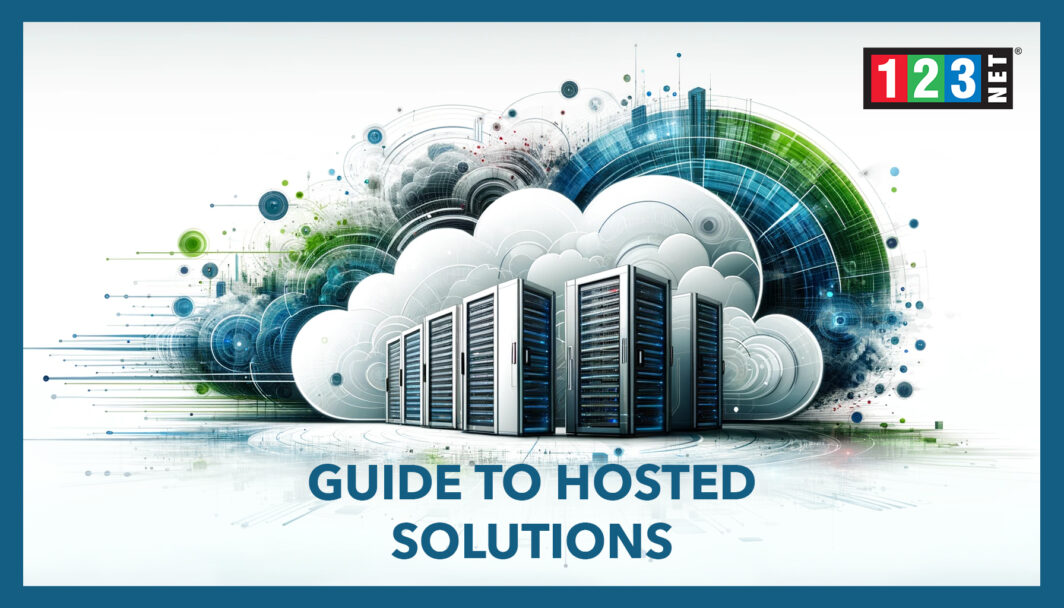
Introduction
Hosted solutions refer to various services provided over the Internet or a dedicated cloud network. These include cloud services, data centers, and virtual hosting. They enable businesses to access and manage data, applications, and services remotely without needing on-premise infrastructure.
The significance of hosted solutions in today’s digital landscape is immense. They offer unparalleled scalability, enhanced cybersecurity, and cost-effective alternatives to traditional IT setups. From small enterprises to large corporations, hosted solutions like SaaS, PaaS, UCaaS, and IaaS play a pivotal role in operational efficiency and strategic growth.
The Evolution of Hosted Solutions
The development of hosted solutions marks a significant shift in how businesses manage and deploy their IT resources. This evolution can be traced back to the earliest days of computing and the internet.

Early Stages:
Initially, businesses relied on large, centralized mainframes for data processing and storage. This era was characterized by limited accessibility and significant investments in physical infrastructure. However, the rise of personal computing in the 1980s began to change the landscape, introducing the concept of distributed computing.
The Internet Era:
With the advent of the Internet in the 1990s, the concept of hosting services began to take shape. Companies started offering shared hosting services, with multiple websites hosted on a single server. This was the first step towards outsourcing IT infrastructure, although it was limited in scalability and resource allocation.
The Birth of Cloud Computing:
The early 2000s witnessed the birth of cloud computing, a paradigm shift that dramatically altered the hosted solutions landscape. Companies like Amazon and Google pioneered this space, offering scalable, on-demand computing resources over the internet. This era also saw the introduction of SaaS (Software as a Service), allowing businesses to use software applications hosted on remote servers.
Virtualization and Managed Services:
The mid-2000s brought virtualization technology, enabling more efficient utilization of physical servers and the creation of virtual machines. This development paved the way for more sophisticated hosting solutions like VPS (Virtual Private Servers) and IaaS (Infrastructure as a Service). Additionally, managed hosting services began to gain popularity, offering businesses a way to outsource their IT infrastructure management completely.
Recent Advancements:
In recent years, hosted solutions have continued to evolve, incorporating advanced technologies like machine learning, artificial intelligence, and edge computing. These advancements have led to more intelligent, automated, and decentralized hosting solutions, offering unprecedented efficiency, scalability, and security.
The journey of hosted solutions from simple shared hosting to today’s dynamic cloud environments reflects the rapid technological advancements and the growing demands of modern businesses for flexible, scalable, and cost-effective IT solutions. This evolution is not just a technological feat but a testament to the changing ways businesses operate in a digital world.
Types of Hosted Solutions
Hosted solutions have evolved to offer a variety of services catering to diverse business needs. Understanding the different types available is crucial for businesses to make informed decisions. Here are the primary types of hosted solutions:

Cloud Hosting:
Description: Cloud hosting involves hosting websites and applications on virtual servers that pull their computing resources from extensive underlying networks of physical web servers.
Key Features: It offers high scalability, flexibility, and reliability. Resources can be scaled up or down depending on demand, making it an ideal choice for websites with variable traffic.
Dedicated Hosting:
Description: Dedicated hosting provides businesses with dedicated servers, meaning that the entire server’s resources are allocated to a single client.
Key Features: This hosting type offers high performance, security, and control. It is best suited for large businesses and high-traffic websites that require customized server configurations and a high level of data privacy.
Shared Hosting:
Description: In shared hosting, multiple websites reside on a single web server, sharing the server’s resources.
Key Features: It is the most cost-effective hosting solution, ideal for small businesses and personal websites with lower traffic levels. The main drawback is limited access to server resources, as they are shared among multiple users.
Virtual Private Servers (VPS):
Description: A Virtual Private Server is a virtualized server that simulates a dedicated server within a shared hosting environment. Technically, it’s both shared hosting and dedicated hosting.
Key Features: VPS provides users with dedicated segments of a server’s resources, offering a balance of cost, control, and performance. It’s suitable for businesses that need more control than shared hosting but less than a dedicated server.
Each type of hosted solution offers unique advantages and limitations. The choice depends on various factors, including the size of the business, the expected volume of traffic, budget constraints, and specific requirements such as customization and control over the server environment. By understanding these options, businesses can align their hosting strategy with their operational needs and long-term goals.
Advantages of Hosted Solutions
Hosted solutions offer a myriad of benefits that cater to the dynamic needs of modern businesses. These advantages range from operational flexibility to cost savings and improved security. Here’s a detailed look at the key benefits:

Scalability and Flexibility:
Explanation: One of the most significant advantages of hosted solutions is their inherent scalability. Businesses can easily scale up or down based on their needs without the need for significant capital investment in physical infrastructure. In today’s fast-paced business environment, where demand can fluctuate unpredictably, this flexibility proves crucial
Impact: It allows businesses to be more agile, responding quickly to market changes or seasonal spikes in demand.
Cost-Effectiveness:
Explanation: Hosted solutions often follow a pay-as-you-go model, which means businesses only pay for the resources they use. This approach eliminates the need for substantial upfront investments in hardware and reduces ongoing costs related to maintenance, upgrades, and staffing.
Impact: Small to medium-sized businesses can particularly benefit from this cost structure, as it allows them to access sophisticated technology without a hefty price tag.
Enhanced Security:
Explanation: With cyber threats becoming more sophisticated, security is a paramount concern for businesses. Hosted solutions providers typically offer robust security measures, including regular updates, backups, and advanced firewalls.
Impact: These measures provide businesses with a level of security that would be expensive and complex to implement in-house. It’s especially beneficial for companies that handle sensitive data.
Reliability and Uptime:
Explanation: Hosted solutions are generally more reliable than traditional on-premise solutions. Providers usually offer uptime guarantees, supported by redundant systems and backup power supplies to ensure continuous service availability.
Impact: High uptime rates are crucial for businesses to maintain operational continuity, customer satisfaction, and reputation.
Accessibility and Collaboration:
Explanation: Cloud-based hosted solutions allow for data and applications to be accessed from any location, at any time. This accessibility facilitates remote work and collaboration among teams spread across different locations.
Impact: It leads to improved productivity, better resource utilization, and a more flexible work environment.
The advantages of hosted solutions are numerous and varied, making them an attractive option for businesses looking to modernize their IT infrastructure, enhance their operational efficiency, and remain competitive in a digital world.
Choosing the Right Hosted Solution for Your Business
Selecting the appropriate hosted solution is critical for achieving optimal performance and efficiency. Guide this decision with a thorough assessment of your business needs, an understanding of different hosting options, and consideration of key factors.
Assessing Business Needs:
Process: Start by evaluating your business requirements in terms of data storage, bandwidth, processing power, and specific applications needed. Consider the size of your business, expected growth, and the nature of your industry.
Outcome: This assessment will help in determining whether a more scalable solution like cloud hosting or a dedicated server is required.
Comparing Different Types of Hosted Solutions:
Approach: Understand the differences between cloud hosting, dedicated hosting, shared hosting, and VPS. Each has unique advantages and drawbacks. For instance, while cloud hosting offers scalability, a dedicated server provides more control and security.
Outcome: By comparing these solutions, you can align the hosting type with your business goals and operational needs.
Key Factors to Consider:
- Cost: Determine your budget for hosting services. Consider both the upfront costs and the long-term operational expenses.
- Scalability: Choose a solution that can grow with your business. Often, businesses prefer cloud solutions for their scalability.
- Security: Assess the security measures provided by the hosting provider, especially if your business handles sensitive data.
- Support: Evaluate the level of customer support offered. Reliable, 24/7 support is crucial for addressing any issues promptly.
- Performance: Consider the performance capabilities of the hosting solution, including server speed and uptime guarantees.
- Compliance: Ensure that the hosting solution complies with relevant industry regulations and standards.
By considering these factors, businesses can make an informed decision about which hosted solution best fits their needs. The right choice will not only support current operations but also provide the flexibility to adapt to future growth and changes in the business environment.
Implementation and Management
Implementing and managing hosted solutions requires a strategic approach to ensure seamless integration with existing systems and optimal ongoing performance. Here’s a guide to effectively implementing and managing these solutions:
Steps for Implementation:
- Planning: Begin with a comprehensive plan that outlines your business objectives, technical requirements, and timelines. This plan should include a clear roadmap for the transition to the hosted solution.
- Choosing a Provider: Select a hosting provider that aligns with your business needs, budget, and technical requirements. Evaluate their reliability, support services, and compliance with industry standards.
- Migration: Migrate your data and applications to the hosted environment. Carefully manage this process to minimize downtime and data loss. It may involve transferring files, databases, and configuring applications.
- Integration: Ensure that the hosted solution integrates smoothly with your existing IT infrastructure. This may involve configuring network settings, user access controls, and data synchronization.
Best Practices for Management:
Continuous Monitoring: Regularly monitor the performance and security of your hosted solution. This includes tracking uptime, resource utilization, and potential security threats.
Updates and Maintenance: Keep your systems up-to-date with the latest software and security patches provided by your hosting provider. Regular maintenance is crucial for optimal performance and security.
Backup and Disaster Recovery: Implement a robust backup and disaster recovery plan. Regular backups and a clear recovery procedure are essential for data protection.
Monitoring and Maintenance:
Performance Monitoring: Continuously monitor the system for any performance issues. Use tools provided by your hosting provider to track server load, application response times, and other critical metrics.
Security Monitoring: Regularly review security logs and alerts. Stay vigilant against new vulnerabilities and ensure that all security measures are up-to-date.
Regular Reviews: Conduct regular reviews of your hosting setup to ensure it continues to meet your business needs. Be prepared to scale resources up or down as required.
Effective implementation and management of hosted solutions are key to leveraging their full potential. By following these guidelines, businesses can ensure a smooth transition to hosted services and maintain efficient, secure, and reliable operations.
Future Trends in Hosted Solutions
The hosted solutions landscape is continuously evolving, driven by technological advancements and changing business needs. Staying abreast of future trends is crucial for businesses to leverage these solutions effectively. Here are some key trends shaping the future of hosted solutions:
Increased Adoption of AI and Machine Learning:
Overview: Artificial Intelligence (AI) and Machine Learning (ML) are increasingly being integrated into hosted solutions to enhance automation, predictive analytics, and efficiency.
Impact: This integration will lead to more intelligent management of resources, improved cybersecurity measures, and better decision-making support through data analysis.
Edge Computing Integration:
Overview: Edge computing, which involves processing data closer to where it’s generated, is expected to grow in tandem with cloud hosting.
Impact: This trend will result in lower latency, faster data processing, and reduced bandwidth usage, particularly beneficial for Internet of Things (IoT) devices and real-time data processing applications.
Greater Emphasis on Cybersecurity:
Overview: As cyber threats evolve, there will be an increased focus on advanced security measures within hosted solutions.
Impact: Expect to see more sophisticated encryption methods, AI-driven security protocols, and compliance with stringent data protection regulations.
Sustainable and Green Hosting:
Overview: The environmental impact of data centers is a growing concern. Future trends include a shift towards more sustainable and energy-efficient hosting solutions.
Impact: This shift will involve using renewable energy sources, improving energy efficiency in data centers, and adopting eco-friendly policies.
Hybrid Cloud Solutions:
Overview: Hybrid cloud solutions, which combine private and public clouds, are becoming increasingly popular.
Impact: They offer the flexibility and scalability of public clouds, while also providing the security and control of private clouds. This trend is especially relevant for businesses with diverse or changing needs.
Serverless Computing:
Overview: Serverless computing, where businesses can build and run applications and services without managing infrastructure, is gaining traction.
Impact: This trend will simplify deployment, reduce costs, and allow businesses to focus more on development and innovation.
The future of hosted solutions is poised to bring more efficiency, flexibility, and security to business operations. By understanding and adapting to these trends, businesses can stay ahead in the digital landscape and leverage the full potential of hosted technologies.
FAQs
- What are Hosted Solutions?
- Answer: Hosted solutions are a range of services provided over the internet or through cloud computing platforms. This includes cloud services, data centers, virtual hosting, and various forms of ‘as-a-service’ offerings like Software as a Service (SaaS), Platform as a Service (PaaS), and Infrastructure as a Service (IaaS). They enable businesses to access, store, and manage data and applications remotely, eliminating the need for extensive in-house IT infrastructure.
- How do Hosted Solutions Differ from Traditional Hosting?
- Answer: Traditional hosting typically involves renting space on a physical server housed in a data center, where resources are limited to the capacity of that specific server. Hosted solutions, on the other hand, leverage cloud technology to provide virtualized resources. This means they offer greater scalability, flexibility, and often improved security and reliability. Businesses can scale resources up or down as needed and only pay for what they use, which is not usually the case with traditional hosting.
- What are the Key Benefits of Using Hosted Solutions?
- Answer: The key benefits include:
- Scalability: Easily adjust resources to meet fluctuating demands.
- Cost-Effectiveness: Reduce upfront infrastructure costs and only pay for resources used.
- Enhanced Security: Benefit from advanced security measures provided by hosting providers.
- Reliability and Uptime: High uptime rates and robust disaster recovery solutions.
- Flexibility: Access data and applications from anywhere, facilitating remote work and collaboration.
- Answer: The key benefits include:
- How to Choose the Right Hosted Solution for a Small Business?
- Answer:
- Assess Your Needs: Determine what your business requires in terms of data storage, bandwidth, and application support.
- Budget Consideration: Evaluate how much you can afford to spend and analyze the cost-effectiveness of different solutions.
- Security Requirements: Ensure the solution meets your data security and compliance needs.
- Scalability Potential: Choose a solution that can grow with your business.
- Customer Support: Opt for a provider that offers reliable, 24/7 customer support.
- Answer:
Conclusion
Hosted solutions represent a significant advancement in how businesses approach their IT infrastructure and data management. Initially, with the evolution of cloud hosting and subsequently, with the emergence of AI and machine learning in server management, these solutions have continuously adapted to meet the ever-changing demands of the digital world. Consequently, they offer unparalleled benefits in terms of scalability, cost-effectiveness, security, and reliability As we look to the future, trends like edge computing, enhanced cybersecurity, and sustainable hosting practices are set to revolutionize this domain further. For businesses aiming to stay competitive and efficient, embracing and adapting to these evolving hosted solutions is not just an option, but a necessity in an increasingly digitalized global economy.




